KISA Companion
Trusted Assistive Technology Designed for NDIS Participants
Smartphones, traditional mobile phones and other communication tools serve a significant number of people with disabilities well. For others, smartphone accessibility settings and software apps can provide access to mainstream smart devices. KISA Companion is designed to help those with more complex communication, cognitive and physical needs, as well as those who need braille to access their device.
KISA Companion is neither a mobile phone, as it doesn’t have a keypad to dial a number, nor a smart device, as it doesn’t have a screen to access the internet or display and view information. KISA Companion is a safety and communication device designed to enhance the safety and support communication for NDIS participants who are unable to use other devices due to, but not limited to, speech, cognitive, and physical disabilities.
For NDIS participants, the KISA Companion isn’t just about communication – it’s a pathway to improved outcomes in daily life. From strengthening social connections and enhancing personal safety to supporting greater choice and control, it gives participants the tools to live more autonomously and with dignity.
Recognised as a low-cost assistive technology under the NDIS, the KISA Companion is designed to help participants achieve their goals by making communication straightforward, accessible, and reliable. If you are one of 600,000+ Australians supported by the NDIS, or a professional helping NDIS participants choose the right assistive technology, KISA Companion is a trusted solution that puts independence and positive outcomes at the centre of care.
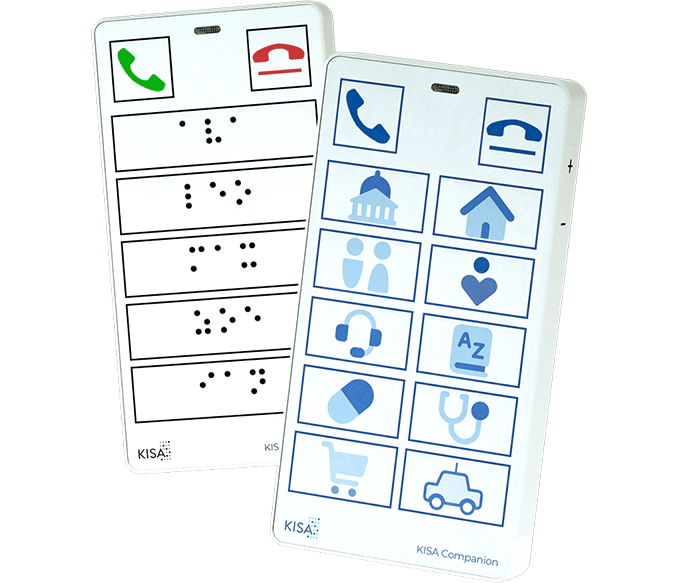
KISA Companion - Making Daily Life Easier and Safer
KISA Companion is designed to do more than assist with communication, it empowers users to live with greater independence, confidence, and connection. By simplifying how people communicate, stay safe, and manage daily routines, it not only supports the user but also provides reassurance for families and carers. Key ways it enhances everyday life include:
- Supports independence – empowers users to communicate effectively without relying on complex devices or constant assistance.
- Promotes inclusion – enables individuals to participate more fully in social, community, and family life.
- Reduces frustration – intuitive tactile buttons make communication simpler and less stressful for users.
- Enhances safety – SOS and emergency features ensure help is always accessible when needed.
- Supports daily routines – reminders for medication or important tasks help users stay on track.
- Reassures families and carers – real-time location sharing and reliable communication offer peace of mind.
- Builds confidence – empowers users to take greater control over their communication and interactions.
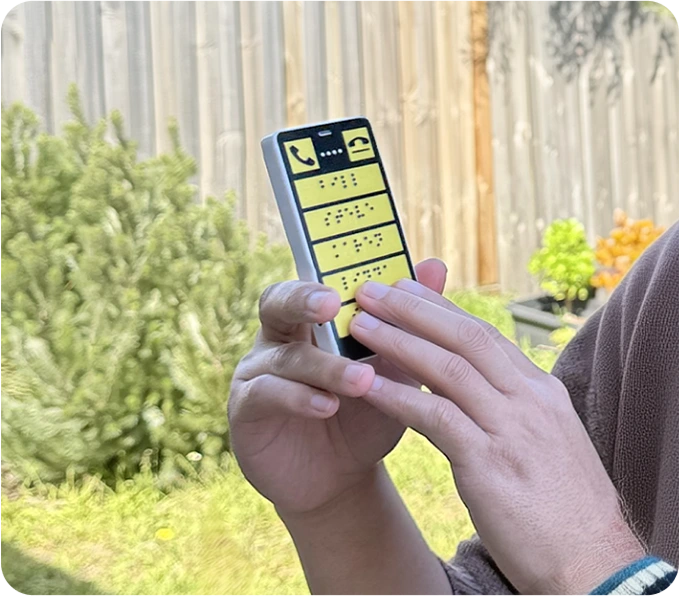
Simple, Reliable and Accessible Features
- Custom-made for each user to meet individual needs. Buttons can be programmed for specific contacts or phrases, adapting to each user’s abilities.
- Accessible design built for people with cognitive, speech or motor impairments; no small screens or complicated menus keeps communication simple and straightforward.
- Large mechanical buttons that provide one-touch calling to up to 10 pre-set contacts.
- Clear button labelling with large text, photos or braille for easy identification.
- Loud, high-quality audio with adjustable volume and noise filtering to prevent auditory overload for users with sound sensitivity or hearing impairments.
- Dedicated SOS button connects users directly with their emergency contacts in urgent situations.
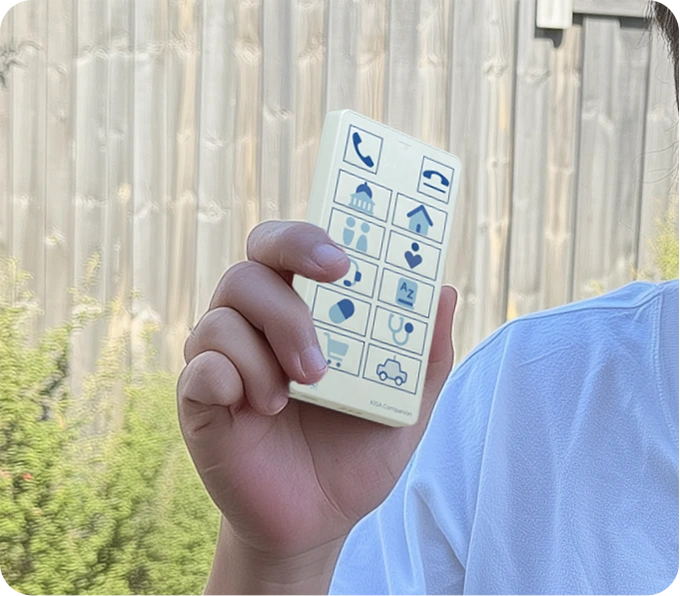
- GPS location tracking allows families, carers, and providers to receive real-time alerts to always know the user’s location.
- Long battery life that lasts up to 3 days on standby, reduces the need for frequent charging.
- Automatic fall detection triggers alerts if a fall occurs, even if the user cannot call for help or press a button.
- Automatic reminders for medication, appointments or daily tasks.
- Simple charging options are available via the included cradle or an optional magnetic cable.
- Eligible for NDIS funding as the device is recognised as low-cost assistive technology.
- Can be used as Augmentative and Alternative Communication (AAC) Device for people with speech and cognitive impairments
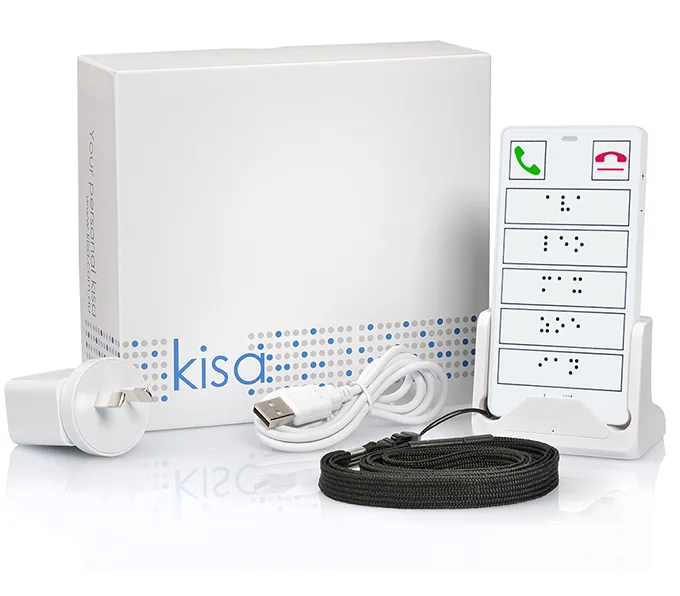
Tailored Communications for Every Ability
The KISA Companion is an assistive technology communication device designed to help individuals with autism, intellectual disabilities, or cognitive impairments communicate more easily. By removing the complexity of menus and touchscreens it provides a fully customisable experience, allowing each device to be tailored with images, photos or symbols to meet the user’s unique needs.
Trusted Contacts Only
To give participants reliable access to the right people while providing peace of mind for carers and loved ones, KISA Companion does not provide internet access or a keypad for unrestricted calling. This ensures NDIS participants cannot accidentally or intentionally dial unapproved numbers. Instead, the device allows contact only with up to 10 trusted family members and support workers whose numbers are pre-programmed.
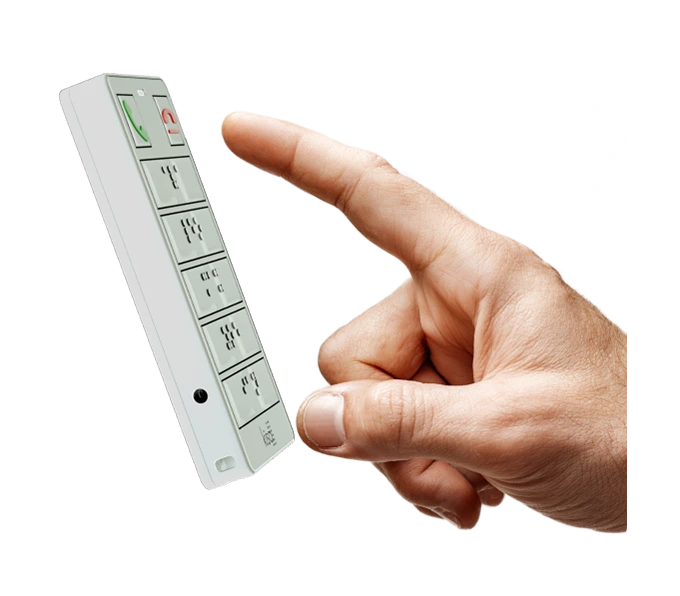
Who Can Benefit Using KISA Companion
- Individuals with intellectual or cognitive disabilities
- People with autism, acquired brain injuries (ABI), or other neurological conditions
- Users with physical impairments
- Individuals with vision impairment

Your caring companion for daily living. Funded through the NDIS.
